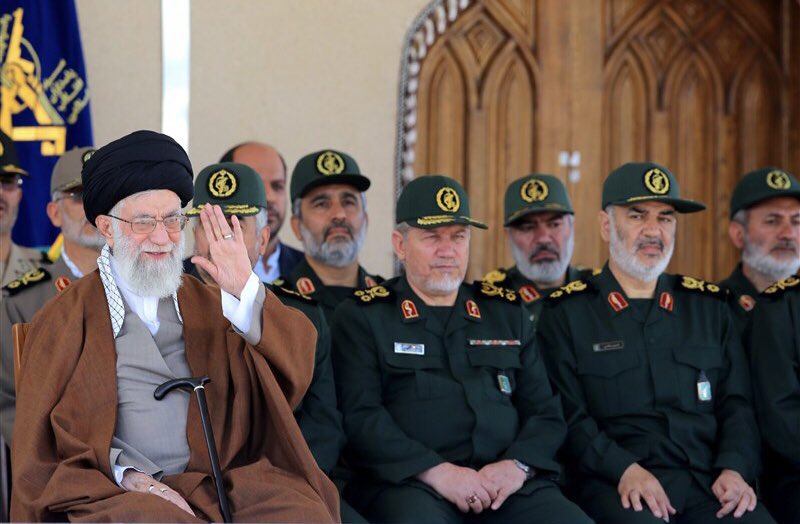FRESH AIR
IRGC listing trend snowballing domestically and internationally
January 16, 2023 | Oved Lobel

The global trend among Western democracies to move to list Iran’s Islamic Revolutionary Guard Corps (IRGC) as a terrorist organisation has been gaining a great deal of momentum in recent weeks, even as increasing numbers of Australian political leaders and community groups have been calling on Canberra to also proscribe the IRGC:
- On January 10, German Foreign Minister Annalena Baerbock reiterated the importance of Germany and the European Union listing Iran’s Islamic Revolutionary Guard Corps (IRGC) as a terrorist organisation and said Germany was actively working to clear legal hurdles to get to a designation, something she first mooted in October. France has said it is keeping the door open to such a possibility, as well. The EU is also planning a new tranche of sanctions against Iran specifically targeting the IRGC.
- Outside of official spokespeople and ministries, more than 100 members of the European Parliament signed a letter to EU High Representative for Foreign Affairs and Security Policy Josep Borrell calling on the European Union to list the IRGC.
- In the UK, members of the House of Commons voted unanimously for a non-binding motion urging the Government to list the IRGC. This all comes within a few weeks after it was first reported that the UK is on the cusp of listing the IRGC.
- In Canada, meanwhile, which already lists the IRGC’s expeditionary Qods Force, there has been a long-standing debate about listing the IRGC in its entirety. While this would give Canada additional tools to punish the IRGC, Canadian Deputy Prime Minister Chrystia Freeland is not waiting on legal technicalities, declaring in October that “The IRGC leadership are terrorists, the IRGC is a terrorist organisation.” Additionally, Canada has imposed sweeping and progressively expanding sanctions on the group.
Inside Australia, there is a wide political and communal consensus on the need to list the IRGC under Australia’s Criminal Code, as evidenced in numerous submissions, including AIJAC’s, to the Foreign Affairs, Defence and Trade References Committee’s inquiry into the human rights implications of recent violence in Iran.
- Australian Greens Senator Jordon Steele-John recently stated:
The Iranian diaspora community has been calling for the Islamic Revolutionary Guard Corps to be listed as a terrorist organisation, and the Australian Government must start listening. This would send a strong signal that Australia will not stay silent in the face of human rights abuses and will act to punish perpetrators who are accountable for these heinous crimes.
- Australian Greens Senator Barbara Pocock has also called on the Government “to expand sanctions against the Iranian regime and to respond to calls from the Iranian people, people around the world, to list the Islamic Revolutionary Guard Corps as a terrorist organisation.”
- Liberal Senator Claire Chandler, in a January 3 Facebook post, called on the Government to “follow the lead of our allies” and list the IRGC, a position reiterated to the Australian ten days later:
Other nations have been forthright in acknowledging this threat and open with the public about IRGC actions targeting their citizens. Australia’s government has not, and that should change. Officials in the UK and EU are moving towards proscribing the IRGC as a terrorist organisation and the Australian government should be taking the same path.
- The Teal independents sent a joint letter to Foreign Minister Penny Wong in early October 2022 calling for the IRGC to be listed, as well, a position since repeated.
Indeed, it seems the only major political grouping to have not even mentioned the IRGC at all, much less the idea of listing it in its entirety under the Criminal Code, is the Government itself.
Australia imposed exactly one round of symbolic sanctions on Iran, on December 10, months after allies had been imposing tranche after tranche and now continue to do so. The announcement of that limited sanctions package did not mention the IRGC as a group, nor does any Government official ever seem to have discussed the group in any context whatsoever.
This is a puzzling state of affairs given the fact that nearly all of Australia’s Western allies have now either listed the group or are in the process of doing so, not to mention the rare internal bipartisan consensus from the Greens to the Teals to the Coalition on the need for this step. It is a state of affairs that really ought to change, both rhetorically as well as practically.
RELATED ARTICLES

Enormous hope that Iran is being liberated: Colin Rubenstein on Sky News

He survived Bondi. Now he’s fighting back: Arsen Ostrovsky addresses AIPAC conference





















